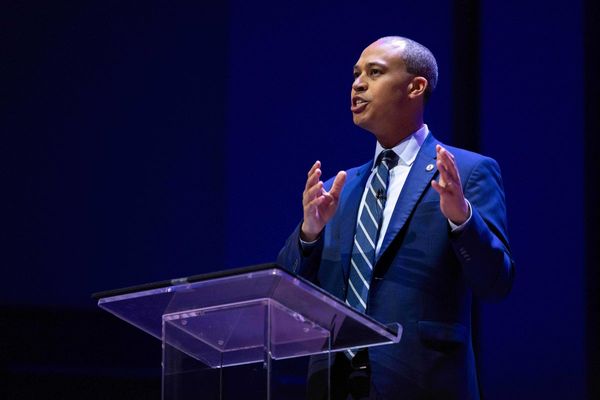When The Harris Poll recruited Will Johnson as co-CEO, the Chicago-based survey company's reputation — and finances — needed help. And fast.
The firm, founded by Lou Harris in 1956, had been a household name. It did public opinion polls for presidential candidates John F. Kennedy and Ronald Reagan, as well as for other leaders and companies worldwide. But following ownership changes in 1996, its reputation and results sagged.
Enter Johnson in 2017. That's when digital communications firm Stagwell Group bought The Harris Poll. Stagwell recruited Johnson and John Gerzema as co-CEOs. Their job? Figure out what had gone wrong. And more important, turn it around.
After years of barely breaking even, the company churned out a profit. And from fiscal 2020 to 2023, the company doubled its revenue, Johnson told Investor's Business Daily.
"I took the job because I believed The Harris Poll was a very underleveraged asset with its great history, trust, goodwill and credibility, so we just needed to inject some dynamism to make the brand relevant and a compelling proposition for customers again," he said.
Apply Early Career Lessons To New Challenges
Johnson spent his life building skills for the challenge at The Harris Poll.
He graduated magna cum laude from Lafayette College. His honors thesis there explored the looming political impact of the millennial generation (born 1981-96).
He then earned his MBA from Northwestern University. And Johnson spent the next decade in advertising and marketing as a senior executive at the WPP's Young & Rubicam Group (now known as YMLY&R). Johnson also took a stint serving as president of its BAV Consulting. There he conducted a major study of consumer behavior and their perceived value of brands.
"It was a great education to understand how society thinks outside of the usual business categories when they compare brand reputations, which was excellent preparation for my work at The Harris Poll," Johnson said.
Lessons from all these jobs stacked up. But altogether, they taught Johnson a key lesson to anyone trying to advise top decision-makers: Add value quickly, or you're gone.
"In the agency business you come to work each day to be useful or become irrelevant," Gerzema said.
Share Responsibilities With Other Leaders
Before Johnson could fix The Harris Poll, though, he did some housekeeping. Many CEOs try run the show solo. But Johnson and Gerzema decided that sharing responsibility would be the best way to turn the firm around quickly and keep it growing.
"We built our co-CEO foundation around complementary strengths, and our responsibilities and skill sets are very well-matched," said Gerzema.
But the two keep themselves responsible for their own areas. Johnson "oversees the day-to-day management of the enterprise," Gerzema said. That includes operations, systems and motivating teams.
Gerzema, on the other hand, handles customer insights, business development and client relations. "We know you are only as good as your last project," he said.
Splitting CEO responsibility isn't common. According to the Harvard Business Review, from 1996 to 2020, of the 2,200 companies listed in the S&P 1,200 and the Russell 1000, just 87 divided the top leadership among two CEOs.
Johnson thought the somewhat unusual arrangement would work.
Invest In People, Products And Services
But turning around The Harris Poll took more than just splitting up the CEO job. A fresh look at the company's product — valued-added surveys — was overdue.
Johnson migrated The Harris Poll's clients away from commoditized one-time custom research. Instead, he shifted them to more of an ongoing consulting relationship. Premium analytics-driven advisory services on powerful trends and consumer thinking replaced static surveys that just get glanced at once. Suddenly, The Harris Poll gave CEOs insights, not just reports.
"We felt we could rebuild the confidence of our researchers and embolden them with their ability to understand data and bring powerful messages to the table," Johnson said.
Meanwhile, Johnson rethought how The Harris Poll collected data in the age of instant communications. "We needed to automate many of the surveys to be more cost-effective and easier for people to answer," he said.
The Harris Poll revamped its surveys so busy people on their smartphone would fill them out, he said. Additionally, it used technology to filter out bots that caused untrustworthy results.
Act As An Advisor
But above all, Johnson wanted to turn The Harris Poll into more than just a pollster. He challenged the company's employees to build relationships with top executives. The firm aspired to become more of a strategic advisor to the top brass at the top companies.
Making the shift wasn't easy. CEOs didn't think of The Harris Poll as relevant to their major decisions.
"We had to hire and train researchers who were imbued with nuance and could tell a story with numbers to clients," Johnson said. "Then we had to overdeliver on results."
The Harris Poll's clients now include Microsoft, Amazon.com, FedEx, Mastercard and 3M , Johnson says.
Communicate Clearly and Authentically
Johnson sees unlimited opportunity for The Harris Poll. On a grand scale, the firm helps companies tell their story to its consumers. That's increasingly important with younger generations, who form relationships with brands.
"It used to be that the chief financial officer was the most important person at a company after the CEO; now it's the chief communications officer," Johnson said.
"Too much of what comes from leaders is in business-speak with too much jargon, reflecting a lack of connection with the lives of customers and front-line employees, a major factor in why most companies get poor grades from both," he said.
Transcend Division
Johnson goes to great lengths to urge employees to imbue their work with nuance. They must empathize with the conflict many The Harris Poll clients face when it comes to political and social polarization.
The Harris Poll has found that 68% of the public believes it is more important for businesses to take a stand on issues today than before. But Johnson cautions brands to act only on what cuts close to their core business.
"What people hunger for is authenticity, which is why the Patagonia clothing company, which is outspoken as a liberal advocate on issues, and the Chick-fil-A restaurant chain, which is known as politically conservative, are respected by a wide spectrum of the public," Johnson noted.
"We're optimists about America, since it is less divided than the media would have one believe because most people don't fit neatly into ideological boxes," said Johnson. "By and large they want their neighbors to be happy and secure and expect leaders to work for solutions."
Ask Smart Questions And Defend Them
But especially in an age of polarization, if you're looking for truth, you must ask the right questions, Johnson says. And that's right in The Harris Poll's wheelhouse.
When polling people about politically charged topics like diversity and equality, how you ask your question is critical. If you simply ask if people support the idea, you'll get canned answers. You must take your questions a step further. Harris instead asks whether people think companies with a diverse workforce give better customer service and are more innovative and successful in the long run. "A huge majority does," Johnson said.
And with detailed data, CEOs can trust The Harris Poll to steer them right, even in charged political areas, Johnson said.
"Companies can't avoid taking political stands because employees and customers, especially the younger ones, demand it," Johnson said. "We tell clients to think carefully about their values before taking a position, but be prepared to double down if it is criticized."
Will Johnson's Keys
- Turned around the fortunes of The Harris Poll as co-CEO starting in May 2017.
- Overcame: Long slump in revenue and reputation under multiple corporate owners.
- Lesson: "The No. 1 piece of advice to give to leaders is to be out talking with customers, rather than designing PowerPoint presentations about their great plans."







